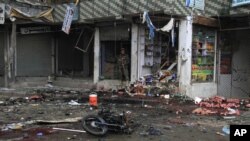United Nations officials and skeptics in Afghanistan appear cautious about claims Islamic State militant group was behind Saturday’s suicide bombing in eastern Afghanistan in which 35 people were killed and more than 100 wounded.
Even though the terrorist group has not formally acknowledged its presence in Afghanistan, local authorities and media have in recent weeks reported the emergence of pro-Islamic State fighters waving its black flag.
The insurgents have claimed the kidnapping of Afghans, including security personnel, and released video images showing the killing of some hostages.
But Saturday’s suicide bombing in Jalalabad was the most lethal act of violence the group’s Afghan allies have claimed.
President Ashraf Ghani, in a nationally televised speech hours later, repeated the claims by the attackers, fueling fears the group is making inroads into Afghanistan. He has on previous occasions warned that IS could attempt to establish bases in his country.
Speaking to reporters in Kabul Sunday, the head of the United Nations Assistance Mission in Afghanistan, Nicolas Haysom, however, cautioned against drawing quick conclusions about the involvement of Islamic State group, known in Arabic as Daesh.
“Quite frankly, there are many contrasting views as to how established and how widespread it is, and whether it is a real Daesh phenomenon or else just some elements of the armed insurgency is looking for a flagpole to attach themselves too. So, all of this will require further investigation,” said Haysom.
The Taliban insurgency has distanced itself from Saturday’s attack, but some fighters who have defected from the group have announced allegiance to IS.
Some critics accuse President Ghani of playing up the IS threat to divert focus from governance and issues like rampant corruption. In a Twitter post, former Afghan intelligence chief Amrullah Saleh responded to the president's claims, saying “IS in Afghanistan is more psychological warfare, more myth than reality.”
Kabul-based political analyst Haroun Mir says authorities have yet to present evidence to support their claims.
“Honestly, we don’t have any tangible evidence of Daesh’s physical presence in the country. I doubt that Daesh would be able to manage from far away, from Iraq or Syria, their sympathizers in Afghanistan," said Mir. "So, it is easy to say Daesh but we have to be a little bit careful not to make free propaganda for a movement that has not yet emerged in the region.
President Ghani’s government has lately come under criticism from rights groups and the public for being unable to devise an effective strategy to stem growing militant violence in the country. However, in his speech Saturday, he defended his six-month old government, saying things have gotten better instead.
Ghani said he inherited a $135 million budget deficit and anti-government armed groups were planning to take over five or six provinces and contractors were ruling the country.
Violence is expected to intensify this year in the traditional spring fighting season because Afghanistan security forces will be battling Taliban insurgents for the first time in a decade without the direct support of international forces. The United Nations has already reported an 8 percent increase in civilian casualties in ground fighting between security forces and insurgents in the first quarter of 2015.










